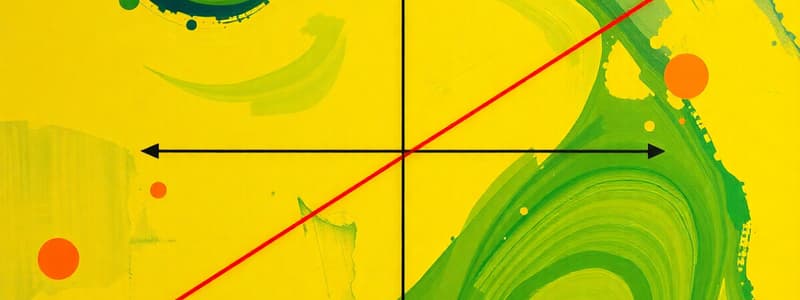Podcast
Questions and Answers
What is considered an implicit cost for a business owner?
What is considered an implicit cost for a business owner?
- Forgone salary from not working elsewhere (correct)
- Rent paid for office space
- Wages paid to employees
- Cost of materials used in production
Which of the following statements about economic costs is correct?
Which of the following statements about economic costs is correct?
- Economic costs consist of explicit and implicit costs. (correct)
- Economic costs include only explicit costs.
- Economic costs are less than total revenue.
- Economic costs are equal to accounting profits.
What is the formula for total revenue (TR)?
What is the formula for total revenue (TR)?
- TR = P - Q
- TR = P + Q
- TR = P × Q (correct)
- TR = P / Q
What happens when a firm experiences zero economic profit?
What happens when a firm experiences zero economic profit?
According to the concept of marginal product, what does a declining marginal product signify?
According to the concept of marginal product, what does a declining marginal product signify?
In the production function Q = f(L, K), what do L and K typically represent?
In the production function Q = f(L, K), what do L and K typically represent?
What type of cost includes only monetary expenses incurred by a firm?
What type of cost includes only monetary expenses incurred by a firm?
What is the relationship between total product, marginal product, and average product?
What is the relationship between total product, marginal product, and average product?
What occurs when the fourth unit of labor is added in a production function?
What occurs when the fourth unit of labor is added in a production function?
How is Total Cost (TC) calculated?
How is Total Cost (TC) calculated?
What happens to Average Cost (AC) when Marginal Cost (MC) is greater than Average Cost?
What happens to Average Cost (AC) when Marginal Cost (MC) is greater than Average Cost?
What is the formula for calculating Marginal Cost (MC)?
What is the formula for calculating Marginal Cost (MC)?
In the long run, which of the following is true about costs?
In the long run, which of the following is true about costs?
Which component of cost does NOT vary with output?
Which component of cost does NOT vary with output?
If a firm's Total Cost changes from 700 to 720 by increasing output by 1 unit, what is the Marginal Cost?
If a firm's Total Cost changes from 700 to 720 by increasing output by 1 unit, what is the Marginal Cost?
Which of the following statements about Average Variable Cost (AVC) is correct?
Which of the following statements about Average Variable Cost (AVC) is correct?
What is the fixed cost for the pizzeria based on the provided cost information?
What is the fixed cost for the pizzeria based on the provided cost information?
What is the marginal cost if the pizzeria increases production from 2 to 3 pizzas?
What is the marginal cost if the pizzeria increases production from 2 to 3 pizzas?
What is the average fixed cost for Vinnie's painting company when painting 4 houses?
What is the average fixed cost for Vinnie's painting company when painting 4 houses?
How do the two tax proposals affect the variable costs for hamburger producers?
How do the two tax proposals affect the variable costs for hamburger producers?
What is the average total cost when Jane's Juice Bar produces 5 juices?
What is the average total cost when Jane's Juice Bar produces 5 juices?
If the variable cost of producing 6 juices is $135, what is the average variable cost for that level of production?
If the variable cost of producing 6 juices is $135, what is the average variable cost for that level of production?
At what production level does the average variable cost begin to increase for the pizzeria?
At what production level does the average variable cost begin to increase for the pizzeria?
What describes a situation where costs decrease as output increases?
What describes a situation where costs decrease as output increases?
What typically signifies constant returns to scale?
What typically signifies constant returns to scale?
What can lead to diseconomies of scale?
What can lead to diseconomies of scale?
What is the break-even quantity given fixed costs of $1,000, a price per unit of $10, and a variable cost of $6 per unit?
What is the break-even quantity given fixed costs of $1,000, a price per unit of $10, and a variable cost of $6 per unit?
In a shutdown decision, when should a firm stop production in the short run?
In a shutdown decision, when should a firm stop production in the short run?
What is defined as the cost that does not change with the level of output?
What is defined as the cost that does not change with the level of output?
Which factor typically allows tech startups to achieve economies of scale despite high fixed costs?
Which factor typically allows tech startups to achieve economies of scale despite high fixed costs?
What would indicate that a firm's average cost is falling?
What would indicate that a firm's average cost is falling?
What is included in the short-run costs for the ice-cream industry?
What is included in the short-run costs for the ice-cream industry?
What constitutes Buffy's opportunity cost of running the amulet store for a year?
What constitutes Buffy's opportunity cost of running the amulet store for a year?
If Buffy sells amulets worth $400,000, what would her accountant consider as the store’s profit?
If Buffy sells amulets worth $400,000, what would her accountant consider as the store’s profit?
What is the marginal product when a fisherman spends an additional hour fishing if he caught 10 lbs in the first hour and 18 lbs in the second hour?
What is the marginal product when a fisherman spends an additional hour fishing if he caught 10 lbs in the first hour and 18 lbs in the second hour?
If the total cost of the fisherman includes a fixed cost of $10 and an opportunity cost of $5 per hour, what would be his total cost after 3 hours of fishing?
If the total cost of the fisherman includes a fixed cost of $10 and an opportunity cost of $5 per hour, what would be his total cost after 3 hours of fishing?
Using the provided data, what is the marginal product for the 2nd worker in Nimbus, Inc. who produces 50 units?
Using the provided data, what is the marginal product for the 2nd worker in Nimbus, Inc. who produces 50 units?
If Nimbus, Inc. has a fixed cost of $200 and pays each worker $100, what would be the total cost of employing 4 workers?
If Nimbus, Inc. has a fixed cost of $200 and pays each worker $100, what would be the total cost of employing 4 workers?
When graphing average total cost and marginal cost, what pattern is usually observed as production increases?
When graphing average total cost and marginal cost, what pattern is usually observed as production increases?
Flashcards
Explicit Cost
Explicit Cost
Money spent on resources like wages and materials.
Implicit Cost
Implicit Cost
The value of the best alternative use of a resource, like the salary you would have earned if you hadn't started a business
Economic Cost
Economic Cost
The sum of explicit and implicit costs.
Total Revenue (TR)
Total Revenue (TR)
Signup and view all the flashcards
Accounting Profit
Accounting Profit
Signup and view all the flashcards
Economic Profit
Economic Profit
Signup and view all the flashcards
Production Function
Production Function
Signup and view all the flashcards
Marginal Product
Marginal Product
Signup and view all the flashcards
Economies of Scale
Economies of Scale
Signup and view all the flashcards
Diseconomies of Scale
Diseconomies of Scale
Signup and view all the flashcards
Constant Returns to Scale
Constant Returns to Scale
Signup and view all the flashcards
Break-Even Point
Break-Even Point
Signup and view all the flashcards
Shutdown Decision
Shutdown Decision
Signup and view all the flashcards
Fixed Cost
Fixed Cost
Signup and view all the flashcards
Variable Cost
Variable Cost
Signup and view all the flashcards
Marginal Cost
Marginal Cost
Signup and view all the flashcards
Marginal Product (MP)
Marginal Product (MP)
Signup and view all the flashcards
Diminishing Marginal Returns
Diminishing Marginal Returns
Signup and view all the flashcards
Total Cost (TC)
Total Cost (TC)
Signup and view all the flashcards
Marginal Cost (MC)
Marginal Cost (MC)
Signup and view all the flashcards
Average Total Cost (ATC)
Average Total Cost (ATC)
Signup and view all the flashcards
Fixed Costs (FC)
Fixed Costs (FC)
Signup and view all the flashcards
Variable Costs (VC)
Variable Costs (VC)
Signup and view all the flashcards
Short Run
Short Run
Signup and view all the flashcards
Per-unit Tax
Per-unit Tax
Signup and view all the flashcards
Lump-Sum Tax
Lump-Sum Tax
Signup and view all the flashcards
Opportunity Cost
Opportunity Cost
Signup and view all the flashcards
Positive Economic Profit
Positive Economic Profit
Signup and view all the flashcards
Study Notes
Costs of Production
- Firms aim to transform inputs into outputs while managing costs.
- Key questions include:
- What are the costs firms face?
- How do these costs influence production decisions?
- Understanding production costs is essential for predicting firm behavior.
Explicit and Implicit Costs
- Explicit Costs: Monetary outlays for resources (e.g., wages, materials).
- Implicit Costs: Opportunity costs of using owned resources.
- Examples:
- Rent paid vs. forgone rental income from using a property.
- Salary forgone by running a business.
Economic vs. Accounting Costs
- Accounting Costs: Include only explicit costs.
- Economic Costs: The sum of explicit and implicit costs.
- Example:
- Total accounting costs: $100,000
- Opportunity cost of owner's time: $20,000
- Economic costs: $120,000
Cost Analysis Exercise
- Exercise example:
- Jenny chooses college over working at her dad's firm.
- Accounting Cost of College: $20,000
- Economic Cost of College: $20,000 + $50,000 = $70,000 (explicit + implicit).
Total Revenue and Profit
- Total Revenue (TR): Income from selling goods. Formula: TR = P × Q (Price × Quantity).
- Accounting Profit: TR – Accounting Costs
- Economic Profit: TR – Economic Costs
- Insights:
- Positive economic profits attract new firms.
- Zero economic profit indicates normal returns.
The Production Function
- Relationship between inputs and outputs (e.g., flour and labor to produce bread).
- Formula: Q = f(L, K) (Output = function of Labor and Capital).
- Demonstrates diminishing marginal product.
Marginal Product
- Marginal Product: Additional output from one more unit of input.
- Formula: MP = ∆Q / ∆Input
- Diminishing marginal product: MP decreases as input increases.
Total, Marginal, and Average Product
- Total Product: The sum of Marginal Products
- Marginal Product: The slope of Total Product
- Average Product: The average of Total Product
Short Run: Diminishing Marginal Returns
- Diminishing Marginal Returns: As an input increases, marginal product decreases.
- Diminishing Marginal Returns typically start after the 4th unit of labor.
Total, Marginal, and Average Cost
- Total Cost: Sum of Marginal Costs
- Marginal Cost: Slope of Total Cost
- Average Cost: Average of Total Cost
Total Cost (TC)
- Fixed Costs (FC): Do not vary with output (e.g., rent)
- Variable Costs (VC): Vary with output (e.g., materials)
- Formula: TC = FC + VC
Average Costs (AC)
- Average Total Cost (ATC): ATC = TC / Q
- Average Fixed Cost (AFC): AFC = FC / Q
- Average Variable Cost (AVC): AVC = VC / Q
Marginal Cost (MC)
- Marginal Cost: Cost of producing one additional unit.
- Formula: MC = ∆TC / ∆Q
Short-Run vs. Long-Run Costs
- Short-Run: At least one input is fixed.
- Long-Run: All inputs are variable.
- Transition: Firms adjust fixed inputs over time.
Short-Run Cost Curves
- Marginal-Average Rule:
- When Marginal > Average, Average increases.
- When Marginal = Average, Average does not change.
- When Marginal < Average, Average decreases.
Long-Run Cost Curves
- In the short run, some inputs are fixed.
- In the long run, all inputs are variable.
- Therefore, a firm necessarily has a lower cost in the long run.
- For each output level, compare the short-run average total costs.
- The smallest number is the firm's long-run average total cost.
Economies of Scale
- Economies of Scale: Costs decrease as output increases.
- Diseconomies of Scale: Costs increase as output increases.
- Example: Factory achieves lower costs by producing in bulk.
- Causes of Economies of Scale:
- Specialization
- Bulk purchasing
- Efficient capital use
Constant Returns to Scale
- Output increases proportionally to inputs.
- Example: Doubling labor and capital doubles output.
- Typical in perfectly competitive industries.
- Long Run = Economies of Scale and # of Firms
Quiz Questions and Answers (Example)
- If Total Cost increases from $100 to $130 when output increases from 5 to 6 units, the Marginal Cost is $30.
Real-World Applications
- Tech startups often face high fixed costs (R&D) but low marginal costs (software distribution).
- Scale economies drive profitability (e.g. SaaS companies).
Break-Even Analysis
- Break-Even Point: When total revenue equals total costs.
- Helps firms determine minimum output required.
Shutdown Decisions
- Short-run decision to stop production if revenue < variable costs.
Problem 1: Cost Definitions
- The needed definitions should include answers for each of these costs: opportunity cost, total cost, fixed cost, variable cost, average total cost, and marginal cost, with the appropriate definitions for each.
- Answers should be provided using definitions from the text.
Problem Types and Examples
- Specific example problems are provided and need solutions:
- Amulet Store Opportunity Cost
- Fisherman's Costs
- Nimbus, Inc. (broom production)
- Juice Bar Costs
- Long-Run Costs (for three different firms)
- Tax Policies (lump-sum tax and per-unit tax)
Problem 10: Long Run Costs
- The given data for the three firms should be analyzed to determine economies of scale and explain the results.
Review of Concepts
- Explicit vs. Implicit Costs
- Short-Run vs. Long-Run Costs
- Economies of Scale and Diseconomies of Scale
- Short-run shutdown decision
Next Lecture Preview
- Firms in Competitive Markets
- Profit Maximization
- Application to _(fill in blank from next lecture topic)
Studying That Suits You
Use AI to generate personalized quizzes and flashcards to suit your learning preferences.




